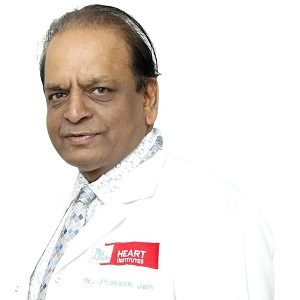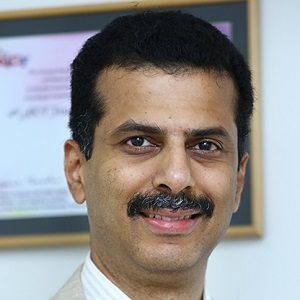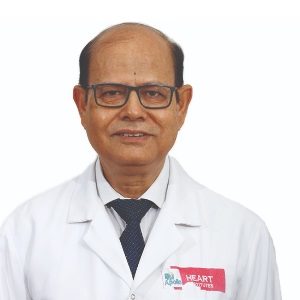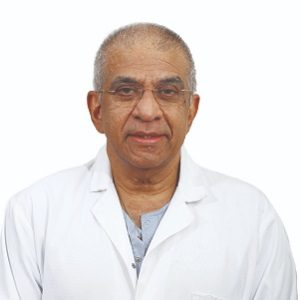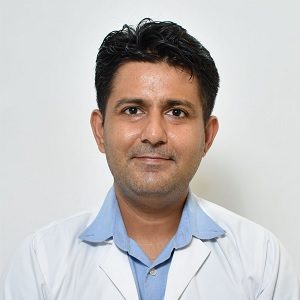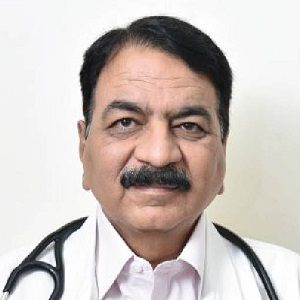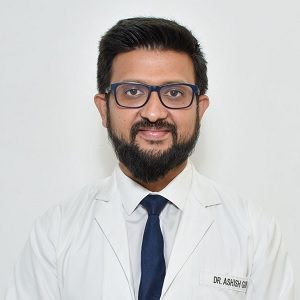Best Doctors in India for Cardiac Catheterization
- Interventional Cardiologist, Chennai, India
- Over 25 years’ experience
Profile Highlights:
- Dr. Prakash Chand Jain is a renowned name among cardiology experts.
- Dr. Jain specializes in Transesophageal Echocardiogram, Atrial Fibrillation, Permanent Pacemaker, and Angioplasty.
- With his 25+ years of experience, he benefitted patients from counseling, diagnosis, and treatment. Some services he offers include TMT, Ambulatory BP Monitoring, MPI Test, PET scan, Valve Repair Replacement, ASD closure, etc.
- Interventional Cardiologist, Chennai, India
- Over 15 years’ experience
Profile Highlights:
- Dr. Sai Satish is an internationally celebrated young cardiologist from Tamil Nadu with expertise in the management of heart-related problems.
- With 15+ years of experience, he assisted patients with symptomatic Aortic stenosis, blood vessel blockages, and heart failure.
- He started a series of structural heart programs for those who are executing structural heart therapies and need to advance them with the best practices. The summit drew over 300 heart surgeons and 350 cardiologists.
- Interventional Cardiologist, Chennai, India
- Over 31 years’ experience
Profile Highlights:
- Dr. G Sengottuvelu is an accomplished Interventional Cardiologist in Chennai.
- He is an expert at managing complex PCI & stenting surgeries and structural heart interventions, including percutaneous heart valve replacement & repair (TAVI / TAVR, mitral clip, etc.).
- Dr. Sengottuvelu carried out around 20000 procedures in his 25 years career. He was a pioneer of the transcatheter valve program in the Apollo Group of Hospitals in 2015, performing the first TAVR.
- Cardiac Surgeon, Cardiothoracic Surgeon, Vascular Surgeon, Chennai, India
- Over 35 years’ experience
Profile Highlights:
- Dr. Dillip Kumar Mishra is a well-known and experienced Cardiothoracic Surgeon in Chennai who has completed 35 years of specialized experience.
- The doctor gained experience working overseas in countries like Italy, Saudi Arabia, Bangladesh-Dhaka, and India.
- The doctor offers the best services to the patients, some of the prominent services include Intra – Arterial Thrombolysis, Mitral/Heart Valve Replacement, Cardio-Thoracic Surgery, bypass surgery, Radial Approach Angiography Balloon Mitral Valvuloplasty, etc.
- Cardiologist, Chennai, India
- Over 23 years’ experience
Profile Highlights:
- Dr. Pramod Kumar is a leading Cardiologist in Chennai with over 23 years of expertise.
- Dr. Pramod has completed his CT coronary angio-procedures training at UCLA in Los Angeles.
- To date, Dr. Pramod Kumar has completed over 1500 TEE & 7500+ interventional cardiology surgeries with a high success rate.
- His core areas of interest include interventional cardiology echocardiography and heart failure treatment.
- Cardiologist, Chennai, India
- Over 35 years’ experience
Profile Highlights:
- Dr. Robert Mao is a renowned cardiac surgeon in Chennai having managed heart diseases for more than 35 years.
- He provides consultation and various diagnostic tests. Some procedures and tests he performs include Angiogram, Open Heart Surgery, TMT, Color Doppler ECG, Vascular Surgery, Mitral/Heart Valve Replacement Aortic Aneurysm Surgery, etc.
- Cardiac Surgeon, Cardiothoracic Surgeon, Vascular Surgeon, Chennai, India
- Over 31 years’ experience
Profile Highlights:
- Dr. Vijay Shankar S is a senior cardio-thoracic Surgeon in Chennai having experience of more than 30 years in Cardiac Surgery.
- Dr. Vijay Shankar was a fellow Coronary Artery Surgery and Congenital Heart Surgery at the University of Wisconsin, USA.
- He provides consultation and diagnostic services for Mitral/Heart Valve Replacement, Cardiac Pacing, Invasive Cardiology, ABPM, Balloon Mitral Valvuloplasty, CT Angiography, etc.
- Cardiologist, Gurugram, India
- Over 15 years’ experience
Profile Highlights:
- Dr. Anurag Passi is a young cardiologist in Gurugram and is well-known for his meticulousness, precise diagnosis, and compassionate care of patients.
- He is proficient in performing procedures like Primary Angioplasty, Transradial Intervention, Pacemaker, ICD and CRT implantation, and Complex coronary interventions (Unprotected Left Main, Bifurcation, and CTO).
- Presently, he is practicing as a Senior Consultant of Cardiology at Fortis Memorial Research Institute in Gurugram.
- Cardiologist, Gurugram, India
- Over 24 years’ experience
Profile Highlights:
- Dr. (Col) B Kalra is one of the best cardiologists in Gurugram, with nearly two decades of experience in Cardiology.
- Due to different pieces of training, Dr. Balbir Kalra has accomplished expertise in Clinical, Invasive, and Non-Invasive Cardiology.
- Cardiologist, Gurugram, India
- Over 15 years’ experience
Profile Highlights:
- Dr. Ashish Gupta is a renowned cardiologist in Gurugram with expertise in noninvasive and interventional cardiac procedures.
- He performed several life-saving primary angioplasties in acute heart attacks, complex heart interventions, and ICD/ CRT/ pacemaker implantations with a high success rate.
- Some of the services available with the doctor include PET scan, Nuclear Thallium Test, TMT, Holter monitoring, echocardiography, etc.
Best Hospitals in India for Cardiac Catheterization
Cardiac Catheterization
Cardiac Catheterization is a medical procedure that allows the doctor to evaluate heart conditions and diagnose & treat cardiovascular conditions. Other names for the procedure are coronary angiogram, cardiac cath, or heart cath.
The doctor will check the functioning of the blood vessels and how well they are supplying blood to the heart. He or she will inject a contrast dye into the blood vessels with the help of a catheter. This will help to create x-ray videos of the heart chambers, valves, and coronary arteries.
Why choose Cardiac Catheterization?
Depending on your conditions, your doctor will recommend the procedure to you to:
- Check the working of your heart muscles.
- Measuring pressure within your heart.
- Check the presence of heart diseases like heart valve disease, coronary artery disease, or disease of the aorta.
- Find the blocked or narrow blood vessels causing chest pain.
- Check the heart’s pumping function.
- Decide on your further treatment like bypass surgery or interventional procedure.
- Check the presence of congenital heart defects.
- Evaluate the problems with the valves of your heart.
- Measuring the oxygen amount in your heart.
Uses of Cardiac Catheterization
The nurse will guide the catheter with the help of a hollow plastic cover called a sheath. If it is in place, your doctor will start the tests required for the diagnosis of your condition. The procedure is useful for your doctor to find and evaluate the problems. Your doctor might perform some procedures during cardiac catheterization including:
- Coronary angiogram that includes injecting a dye with the help of a catheter. Your doctor will watch the path of the dye by an x-ray machine as the dye travels to check the narrowing of arteries or their blockages.
- Repair of the defects of the heart like closing a hole or stopping leaks from a valve.
- Ablation, for correcting heart arrhythmia or irregular heartbeat.
- Thrombectomy, done with the help of a catheter to remove blood clots that may dislodge & travel to other tissues or organs.
- Angioplasty, that involves the insertion of a catheter with a balloon at the tip into the artery. The balloon widens your artery upon inflation.
- Stent placement within your artery to keep the artery open. Stent placement involves placing a metal coil in the narrowed or blocked artery for preventing problems in the future.
- Balloon valvuloplasty, involving inflation of a balloon-tipped catheter into the blocked heart valves for opening the blockages.
- Biopsy for which the doctor will take a sample tissue from your heart.
Benefits of Cardiac Catheterization
Preparing for the procedure
Your doctor might instruct you if you need to prevent eating or drinking before Cardiac Catheterization. Usually, the doctors ask the patients to avoid drinking or eating from the night before the procedure. This is because liquids or foods may cause complications for the procedure. However, you may need to reschedule the procedure if you weren’t able to fast from midnight before the procedure. Your doctor might also instruct you to avoid taking certain medications.
You need to change into a hospital gown before Cardiac Catheterization. Your nurse will then put up an intravenous line or IV line to give you fluids & medication before, during, and after Cardiac Catheterization. Your nurse will also inject an anesthetic to numb the area before insertion of the catheter. Although you will be sedated during the procedure, you will be able to respond to the instructions of your nurse or doctor. Your nurse may ask you to take a deep breath, cough, or place your arm at various positions to get the best images of your arteries.
What to expect?
Before the procedure
Your nurse will check your pulse and your BP first. Your doctor will also you to remove your dentures or any jewelry that you might be wearing so that they don’t interfere with the images of the heart. He or she will ask you to wait in the pre-operative room before they could start the procedure.
During the procedure
Your doctor will perform the procedure in the operating room with special imaging & x-ray machines. The room will be a sterilized area to avoid any chances of infection. Your doctor will perform the procedure under sedation but you will be awake. However, he or she may administer general anesthesia for other procedures done with Cardiac Catheterization. The nurse will insert an IV line into your arm or hand for giving additional medications needed during the procedure. Your doctor will place electrodes or monitors on your chest to check the heartbeats during the procedure.
The nurse will shave the hair from the area of insertion of the catheter before the procedure. Before inserting the catheter into your artery, your doctor will administer an anesthetic to numb the site. Before there is numbness, you might feel a quick pain. After you start feeling numb, he or she will insert the catheter. Your doctor will make a cut or incision to access the artery. He or she will insert the plastic sheath within the cut to allow easy insertion of the catheter.
Now, according to your condition and the reason for Cardiac Catheterization in your case, the doctor will perform other procedures like biopsy or right heart catheterization or any other procedure. If you are awake during the procedure, your doctor may give you some instructions or tilt your table at times with the safety strap on.
After the procedure
Your doctor will ask you to rest in the recovery room for several hours after the procedure till the effects of anesthesia disappear. He or she will immediately remove the plastic sheath inserted in your body after the procedure. Your nurse will apply pressure on the insertion site after removing the catheter. You will go to a regular hospital after leaving the recovery room. You can eat or drink after the completion of the procedure. Your condition will help to decide if you can go home or need to stay back in the hospital for a day or two. If you have an additional procedure, your doctor might ask you to stay overnight in the hospital.
Results
Risks
Similar to other procedures, Cardiac Catheterization too, has some risks associated with it. However, major complications will rarely happen. The risks associated with this procedure may be:
- Bleeding
- Damage to the artery or heart
- Kidney damage
- Bruising
- Stroke
- Allergic reaction due to medications or dye
- Blood clots
- Heart attack
- Arrhythmia or irregular heart rhythm
- Infection
- Damage to the area of insertion of the catheter

